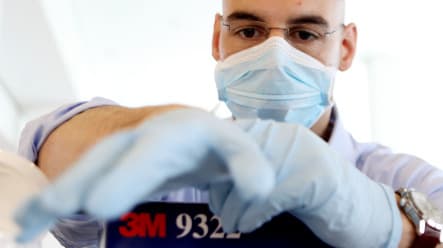A/H1N1 vaccination plan a big experiment, doctor says

The enormous vaccination programme against the A/H1N1 swine flu virus due to start this autumn across Germany is nothing less than a huge experiment, a prominent critic of the pharmaceutical industry says.
Wolfgang Becker-Brüser, doctor and publisher of the arznei-telegramm magazine which details critiques of the pharmaceutical industry, says current safety testing rules allow for up to a quarter of a million people to have serious reaction against the vaccine.
Conditions set out for the vaccine, which is still being developed, to be licensed for use, are particularly lax, he alleges.
Only those reactions which occur "frequently" – meaning at least once in each 100 test patients, would be noted and considered serious, says Becker-Brüser.
This means that if the target of 25 million Germans being vaccinated is met, nearly 250,000 could have a serious reaction against the vaccine.
His warning comes as a report was released showing that half of children in England who have been given the current flu drug Tamiflu, used to keep the A/H1N1 flu at bay, have suffered side-effects such as nausea, insomnia and nightmares.
Others are also having second thoughts about the wisdom of injecting as much as a third of the population with a brand new vaccine.
Matthias Gruhl, head of the health care office in Bremen state, who is responsible for pandemic planning told Der Spiegel magazine, “If the swine flu stays as harmless as it is now, a mass vaccination programme would not be justified.”
He said current plans were being drawn up on the assumption that a second, much worse wave of infections would come later in the year.
But he said there was no indication that this would actually happen.
There are also suggestions that the vaccine is likely to cost the public purse more than initially calculated, according to Der Spiegel.
The magazine reported that €410 million will be needed for the vaccine from GlaxoSmithKline, making the sum of €650 million set aside by the Health Ministry realistic only if the state health ministries actually undertake the vaccinations.
Should doctors become involved, and the vaccine be ordered via pharmacies, the programme will cost more than €1 billion, the magazine said.
Comments
See Also
Wolfgang Becker-Brüser, doctor and publisher of the arznei-telegramm magazine which details critiques of the pharmaceutical industry, says current safety testing rules allow for up to a quarter of a million people to have serious reaction against the vaccine.
Conditions set out for the vaccine, which is still being developed, to be licensed for use, are particularly lax, he alleges.
Only those reactions which occur "frequently" – meaning at least once in each 100 test patients, would be noted and considered serious, says Becker-Brüser.
This means that if the target of 25 million Germans being vaccinated is met, nearly 250,000 could have a serious reaction against the vaccine.
His warning comes as a report was released showing that half of children in England who have been given the current flu drug Tamiflu, used to keep the A/H1N1 flu at bay, have suffered side-effects such as nausea, insomnia and nightmares.
Others are also having second thoughts about the wisdom of injecting as much as a third of the population with a brand new vaccine.
Matthias Gruhl, head of the health care office in Bremen state, who is responsible for pandemic planning told Der Spiegel magazine, “If the swine flu stays as harmless as it is now, a mass vaccination programme would not be justified.”
He said current plans were being drawn up on the assumption that a second, much worse wave of infections would come later in the year.
But he said there was no indication that this would actually happen.
There are also suggestions that the vaccine is likely to cost the public purse more than initially calculated, according to Der Spiegel.
The magazine reported that €410 million will be needed for the vaccine from GlaxoSmithKline, making the sum of €650 million set aside by the Health Ministry realistic only if the state health ministries actually undertake the vaccinations.
Should doctors become involved, and the vaccine be ordered via pharmacies, the programme will cost more than €1 billion, the magazine said.
Join the conversation in our comments section below. Share your own views and experience and if you have a question or suggestion for our journalists then email us at [email protected].
Please keep comments civil, constructive and on topic – and make sure to read our terms of use before getting involved.
Please log in here to leave a comment.